
DUTCH macadamia expert, Hans Werweij, who wrapped up a two-week scoping exercise in Zimbabwe last Friday, says Zimbabwean macadamia growers are technically competent but need to collaborate better to ensure consistency and quality of Zimbabwean nuts.
By Kuda Chideme
Werweij, who has 40 years’ experience in tropical forestry management, visited Zimbabwe through a standing memorandum of understanding between Netherlands senior expert consultancy, PUM, and Zimbabwe’s trade development and promotion body ZimTrade.
“We wanted to see the state of the art of growing macadamia in Zimbabwe, and what needs to be done to progress further. We visited numerous large and small-scale growers in Chipinge as well as a pioneering grower in Nyabira, who is proving the potential for the nut to be grown in other parts of the country too,” Werweij said.
According to estimates from Agritex and a survey of players in the industry, Zimbabwe has an estimated 5 000 hectares of land under macadamia, producing an average of three to four tonnes per hectare. This figure is inclusive of established plantations as well as the numerous younger orchards that are not yet fruiting.
Visits to plantations in Chipinge also revealed differing commitment by growers, with some plantations receiving exemplary estate management, while others were being neglected.
“Through research and information-sharing on best practice estate management, which includes planting the suitable plant variety and appropriate methods, pest control, pruning, and soil fertility management among other things, production could rise from four tonnes per hectare to eight to 12 tonnes,” Werweij said.
Other critical issues identified during the visits to growers included crop theft and the lack of research into suitable varieties for growing in different parts of Zimbabwe. Werweij believes that even within Chipinge, there is scope for more varieties to be grown, thus increasing the quality and quantity of nuts being produced. Currently, Zimbabwean growers are using two varieties.
- Chamisa under fire over US$120K donation
- Mavhunga puts DeMbare into Chibuku quarterfinals
- Pension funds bet on Cabora Bassa oilfields
- Councils defy govt fire tender directive
Keep Reading
ZimTrade export development officer Admire Jongwe, says in line with Werweij’s recommendations and with global best practice, ZimTrade is advocating for a macadamia association to be established in the country.
“It has been proven in other countries that a formal body representing the interests of macadamia growers can go a long way in ensuring that both output and quality increase. With co-ordination, Zimbabwe can derive enormous value from exporting macadamia nuts to Asia and Europe, but there is a lot to be done in terms of research and development, as well as marketing to ensure that Zimbabwe’s nuts are up to spec and effectively reaching the international market,” he said.
“We should not take for granted the commitment and technical skill needed to unlock the potential of this nut to improve our exports. Through collaboration, we can achieve this, and macadamia will earn Zimbabwe a lot of foreign currency, even in the medium term,” Jongwe added.
Innocent Simango, a macadamia farmer in Chipinge, echoed the need for collaboration to address the threat posed by emerging competitors, including Mozambique and Zambia.
“As Zimbabwe, we should engage small-scale farmers and build production to justify investment into facilities for value-adding our nuts. Even if we are just removing the shell, we should do this, since the kernels attract much higher returns than nuts-in-shell (NIS),” he said.
Macadmia nuts are gaining popularity worldwide due to their health benefits, high oil content, and other applications, including using the shell in filtration and in the fabrication of carbon and plastic products.
Zimbabwe is currently exporting macadamia worth about $4,2 million, a far cry from the global value of about $317 million.
The trade of macadamia rose from about $145 million in 2013 to $317 million in 2017.











